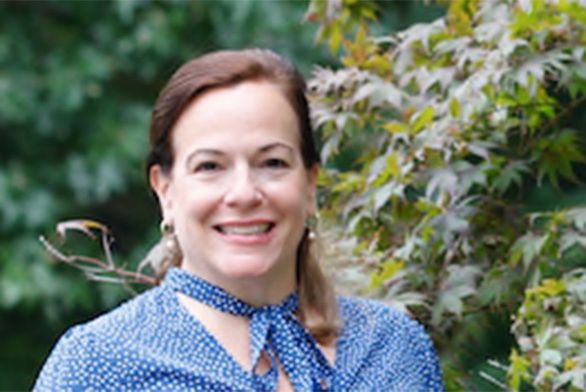Nuclear Physicist and Cancer Researcher Cynthia Keppel Hellman (A84) to Receive Award of Merit
July 22, 2019 | By Eve Tolpa

For nuclear physicist and cancer researcher Cynthia (Thia) Keppel Hellman (A84), the practice of science has a lot in common with a St. John’s education.
“The curriculum is focused on understanding the most important ideas of Western civilization, and focusing on understanding and testing big ideas is what forefront science is all about,” she says. “Scientists need to listen to their colleagues describe their theories, results, models—and try then to discern common patterns and larger truths from a multitude of puzzling data and voices. Sound like a seminar to you?”
A Hampton University professor of nuclear, quantum, and medical physics and a group leader at the Thomas Jefferson National Accelerator Facility, Keppel was recently chosen to receive a St. John’s College Alumni Association Award of Merit at this year’s Homecoming—an honor she describes as “awesome.”
It’s certainly well-deserved. Among Keppel’s many professional accolades is a National Science Foundation CAREER Award and a 2019 Distinguished Lecturer on the Application of Physics award from the American Physical Society, where she is a fellow. As a former technical director of the Hampton University Proton Therapy Institute, Keppel headed up the world’s largest free-standing proton therapy facility. She has also authored more than 180 peer-reviewed scientific publications and serves on multiple scientific advisory boards for both the private and public sector, including the National Nuclear Science Advisory Council.
The St. John’s education pervades several aspects of her career. One part of her work, Keppel says, “is very big-picture, trying to answer questions at the forefront of human curiosity, issues like ‘What is the origin of mass?’ Here, I work in large multinational teams with some of the smartest people on the planet and utilize some of the most advanced technology yet created. What could be more fun?”
Another, more technical aspect is applying nuclear physics to medical technology. Keppel currently holds 13 patents, all of which focus on cancer treatment, “specifically on applying advanced radiation detection and characterization techniques pioneered in nuclear physics to radiotherapy.”
It’s work she calls “highly rewarding,” but there are some surprises, too.
“It’s quite impressive how long it takes to bring a good idea to market,” Keppel explains. “In the physics lab, we are constantly making things basically, if not gracefully, work—putting new things together, developing on the fly, letting necessity mother invention. Yet the commercial world is strikingly different. As an example, RadiaDyne took nearly a decade from the time they licensed our patents to the banner year of 2018 when they released their double national award-winning product.”
As Keppel’s career continues to progress, so does her gratitude for her St. John’s education.
“There was a time that I feared I wasted my time not having started on a technical path earlier—more math, more problem-solving, more time building cool stuff in the lab,” she says. “But looking back, that four years does seem quite valuable. It’s a beautiful, shiny object that stands out on its own in my past for me [exemplifying] freedom, not drive; ‘thought’ time, not career-building. I have solidified my appreciation for the ‘soft skills’ I mentioned above—for general human interaction and even management, but also for the scientific endeavor. When presenting your work, the ability to articulate your argument clearly and in context is a major plus.”
Keppel will be using those communication skills this fall, when she is scheduled to give a TEDx talk in Charlottesville, Virginia—“I welcome any and all Johnnies to come and hang out!” she says.
Hanging out with Johnnies, in fact, is a regular part of Keppel’s life, and her relationship with the college is ongoing. She and her husband, a fellow alumnus, make a point of attending as many five-year campus reunions as they can.
“We love this,” Keppel says. “It’s an amazing thing about the Program and school that we still feel immediately close to other Johnnies and can talk for hours with our classmates as though we left off just yesterday. It’s an amazing shared experience.”

